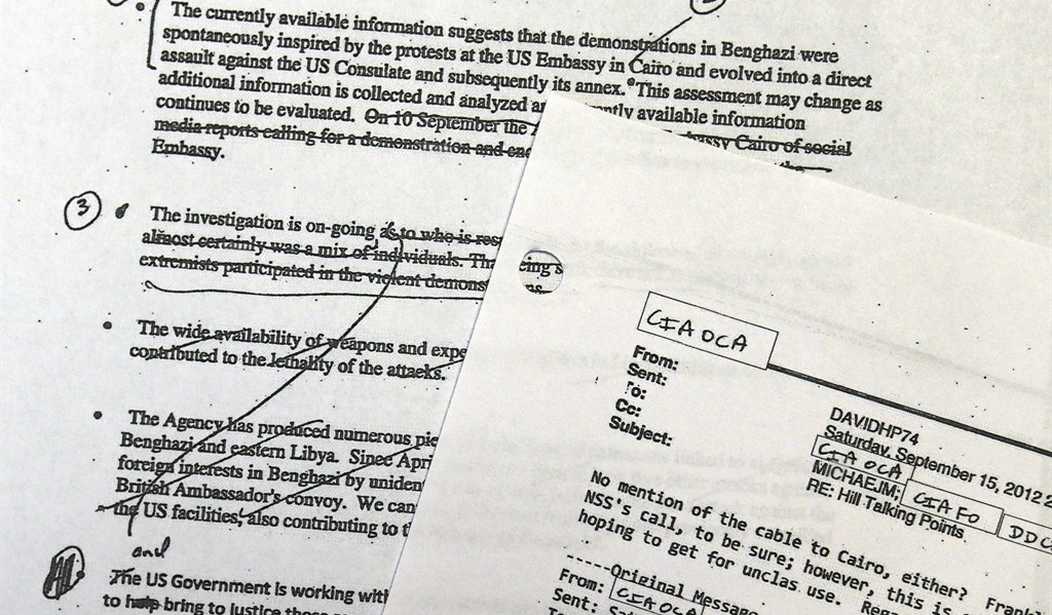To paraphrase an irate Dennis Green, the administration's Benghazi talking points were what we thought they were, based on multiple previous reports. ABC News
The emails confirm the ABC News report that the so-called "talking points" written by the CIA on the attack underwent extensive revisions – 12 versions – and that substantial changes were made after the State Department expressed concerns. The early versions of the talking points, drafted entirely by the CIA, included references to the al Qaeda affiliate Ansar al-Sharia and to previous CIA warnings about terror threats in Benghazi. State Department spokesman Victoria Nuland expressed concerns about including those references in the talking points.
In one email, previously reported by ABC News, Nuland said that including the CIA warnings "could be used by Members [of Congress] to beat the State Department for not paying attention to Agency warnings so why do we want to feed that? Concerned …" After some changes were made, Nuland was still not satisfied. "These don't resolve all my issues or those of my building leadership," Nuland wrote. A senior administration official said that Deputy CIA Director Mike Morrell agreed with Nuland's concerns and made the changes himself. There is no email record, however, showing that Morrell shared Nuland's concerns.
Recommended
The emails do show that the erroneous "spontaneous demonstrations" talking point was included in the original, CIA-produced drafts. However, references to terrorist involvement and prior security warnings were erased at the behest of the State Department, based on nakedly political considerations. Note, too, that many of these 100 pages were duplicative, and do not cover the key deliberations of September 12th and 13th -- the days immediately following the attack. Amb. Chris Stevens' second in command personally told Sec. Clinton that the Benghazi raid was an orchestrated terrorist attack as it was unfolding on 9/11. An Assistant Secretary of State affirmed that self-evident truth in an email to a Libyan official the next day (skip to 2:05 in that clip). Four days later, Amb. Susan Rice went on five television shows, downplayed and dismissed the terrorism connection, and said the incident was the "direct result" of an obscure YouTube video. Stephen Hayes, who got this ball rolling a few weeks ago, summarized his analysis of the newly-disclosed email trail:
On first read, #Benghazi emails very bad for Carney, State Dept, Clinton, Jake Sullivan, Victoria Nuland. Not good for WH, CIA. Good- Rhodes
— Stephen Hayes (@stephenfhayes) May 15, 2013
Hayes' full analysis of the new data dump is here. Don't forget that (a) CIA Director David Petraeus called the final sanitized talking points "useless," and (b) Jay Carney claimed last year that the White House and State Department had only made one cosmetic change to the talking points. These emails totally contradict that assertion. One CIA email goes so far as to say that the State Department objected to "much or most" of the original points, which included mentions of terrorism and warnings. "We revised the document with their concerns in mind," the email says. Another email from the CIA mentioned that the FBI also believed the attack was the work of terrorists. That detail was struck in order to placate State. Take a look at what was scribbled out, even though it was the intelligence community's best assessment of the situation:

That's a whole lot of relevant, accurate intel stricken from the record just to save face for the State Department. Allahpundit makes a trenchant observation that gets to the core of State's political calculus in all of this:
Another State Department deputy, David Adams, complained earlier in the evening (page 40) that that fourth paragraph “will read to members like we had been repeatedly warned.” But they had been repeatedly warned: That was the whole point of the initial Benghazi testimony last year from Eric Nordstrom, culminating in his claim that the “Taliban is on the inside of the building” at State because they wouldn’t listen to repeated requests for more security. On the day he died, Stevens sent a cable to State emphasizing his concerns about “growing problems with security” in Benghazi. O’s critics have chased a thousand different strands of this story, but that remains the most egregious element of it. State’s diplomatic team in Libya begged them for more security and were refused. And after it was over, Nuland and Adams fretted that the public might conclude they hadn’t done enough to protect their troops if the talking points were left as is. Heaven forbid.
Nuland, Adams, and...someone else. Check out this screen grab of one of Nuland's emails airing worries about including truthful information in the talking points. She writes, "I just had a convo with [redacted]...on that basis, I have serious concerns about all the parts highlighted below." Those "parts" were the bits about terrorist activity and the recent history of security problems in Benghazi. Nuland writes that she doesn't want to let Congress "abuse" those facts to make the State Department look bad, even though their negligent behavior warranted negative scrutiny. So who was the redacted person with whom Nuland "had a convo" before ramping up pressure to scrub the talking points of politically problematic details? I've got a guess, but the public has a right to know who was driving Nuland's political games. How ironic that the White House keeps accusing truth-seekers on these questions of "politicizing" the issue.
UPDATE - A follow-up to a related story we've been following: CBS News' Sharyl Attkisson says network executives, including president David Rhodes, have been supportive of her Benghazi reporting. It's CBS News' shows/producers that haven't shown much interest.

























Join the conversation as a VIP Member